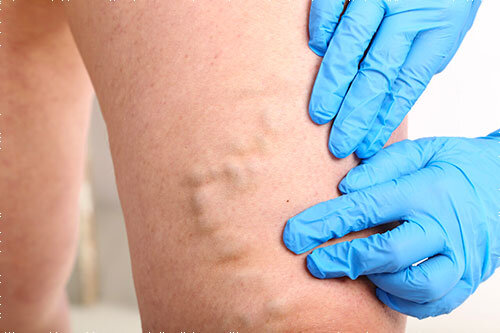Early Stages of Varicose Veins Symptoms
Do your legs feel heavy, achy, itchy, or have a burning sensation, especially at the end of the day? Do you spot swollen and twisted veins on your legs?
These veins are called varicose veins. More than 40 million Americans have varicose veins. Though many consider them as a cosmetic issue, they may indicate circulatory problems and may lead to serious health issues if left untreated.
Varicose veins can worsen over time, so knowing the early symptoms can help determine effective treatments and avoid any serious complications.
Understanding Varicose Veins
Veins are an important part of the body's circulatory system that carries blood to the heart.
Veins have one-way valves that keep blood flowing back to the heart. If the valves get damaged or weakened, blood backs up and starts to pool in the vein, causing swelling.
These twisted and bulging veins are most commonly found in your legs.
Risk Factors
There are certain factors that increase the chances of developing varicose veins.
Family history: Statistics show that up to 50% of people with varicose veins have a family history of the condition. If you have a family member with varicose veins, the odds are against you.
Excess weight: Extra weight puts more pressure on the veins, causing them to weaken and develop varicose veins.
Sitting or standing for long periods: Staying in the same position for prolonged periods of time can increase the pressure on veins and affects blood circulation.
Age: As you get older, the valves naturally get weaker, leading to the development of varicose veins.
Pregnancy: The increase in blood volume, extra weight, and hormonal changes put pressure on your abdomen and leg veins. Many pregnant women notice varicose veins develop during their pregnancy and go away within a year after labor.
Early Warning Signs and Symptoms
Before the swollen twisted varicose veins form, you may notice some early symptoms including the following:
Swollen Feet
If you notice frequent swelling in the legs and ankles after a long day, it's likely an early warning sign of varicose veins.
Red Spots On Lower Legs
This skin discoloration may indicate that you have chronic venous insufficiency and you have more risk of developing varicose veins at any time soon.
Achy Legs & Heavy Legs
Leg pain is a common symptom that is associated with varicose veins. People who experience leg pain, cramping and swollen legs often have more chances of developing varicose veins.
Even without these early symptoms, there is a chance that you may develop varicose veins if you have a family history or are exposed to other risk factors. It's important that you are aware of your risks and manage your symptoms early.
Diagnosis and Treatment of Varicose Veins
Depending on the stage of the vein disease, a vein specialist will determine different treatment options for you. Early diagnosis of varicose veins can have simpler treatments.
In some cases, if left untreated, varicose veins can worsen and cause other symptoms to develop.
Treatment options may include:
Conservative therapy: Conservative therapy is a combination of a healthy diet, exercise, and wearing compression stockings.
Sclerotherapy: A vein doctor will inject the solution into problematic veins to reroute blood flow to healthy veins.
Endovenous: Laser Ablation — Problematic veins are sealed by laser heat.
Varicose Veins Treatments Near Me
The best time to seek treatment for vein disease is when you first notice the symptom.
Contact Physicians Vein Clinics at (888)-782-8346 for a free consultation with one of our vein specialists.
Why Physicians Vein Clinics
10 convenient vein centers across South Dakota, Minnesota, and Iowa
Minimally-invasive procedures for varicose veins, spider veins, and vein-related symptoms
Highly trained and skilled vein doctors

